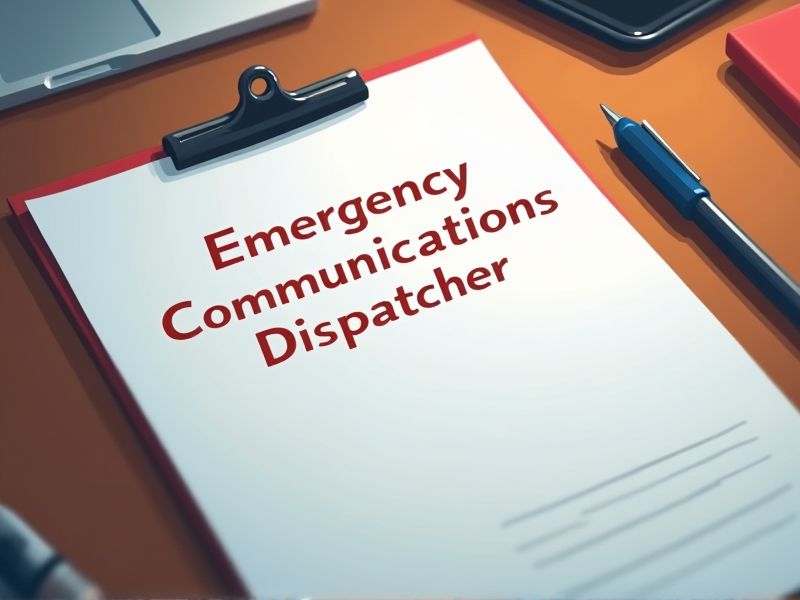
Emergency Communications Dispatchers are pivotal in managing critical information flow during emergencies, directly affecting the efficiency of response teams. The dynamic nature of emergencies requires dispatchers to have specific skills, necessitating certain certifications. These certifications ensure that dispatchers can handle high-stress situations, prioritize calls, and effectively utilize communication technology. Notably, here are some crucial certifications you may need as an Emergency Communications Dispatcher.
Emergency Medical Dispatcher (EMD) Certification
Emergency Medical Dispatcher (EMD) Certification enhances an Emergency Communications Dispatcher's skills in assessing medical situations, ensuring a more effective initial response. This certification enables dispatchers to provide critical pre-arrival instructions, crucial for life-saving interventions before emergency services arrive. It standardizes the level of care and communication, reducing the risk of miscommunication during critical situations. EMD certification also improves overall efficiency in emergency call centers, leading to faster, more informed decision-making processes.
Public Safety Telecommunicator Certification
Public Safety Telecommunicator Certification enhances the credibility and skill set of an Emergency Communications Dispatcher, leading to improved public trust. This certification ensures dispatchers are proficient in the latest communication technologies and protocols, which optimizes emergency response times. The certification process includes rigorous training, reducing the likelihood of errors during high-pressure situations. Compliance with established standards promotes uniformity and interoperability across various emergency communication systems.
Fire Service Communications Certification
Fire Service Communications Certification ensures that emergency communications dispatchers possess critical knowledge of fire service protocols, enhancing their ability to manage fire-related emergencies efficiently. Certification training often includes scenario-based exercises, equipping dispatchers to make quick, informed decisions under pressure, which can significantly impact response times and outcomes. The certification establishes a standardized skill set among dispatchers, leading to more effective interagency communication during multifaceted emergency responses. Employers value certified dispatchers for their demonstrated competency in handling high-stakes situations, which can result in improved public safety and trust.
Medical Priority Dispatch System (MPDS) Certification
MPDS certification ensures emergency communications dispatchers can accurately assess and prioritize medical calls using a standardized protocol, improving response efficiency. By certifying dispatchers, MPDS reduces the likelihood of errors during emergency situations, enhancing overall patient safety and care quality. It provides dispatchers with crucial training for handling diverse medical scenarios, which results in appropriate and timely emergency response. Certification fosters trust and accountability within the emergency response system, elevating community confidence in public safety services.
Computer-Aided Dispatch (CAD) Operations Certification
Certification ensures dispatchers understand standardized procedures, reducing errors in emergency response. Training in CAD operations enhances technical skills, enabling efficient management of real-time information. Knowledge of CAD systems increases interoperability among various emergency services, facilitating coordinated efforts. Certification acts as proof of competency, building public trust in emergency communication systems.
Crisis Intervention Management Certification
Emergency Communications Dispatchers face high-stress situations where effective crisis intervention can significantly impact the outcomes for individuals in distress. The Crisis Intervention Management Certification equips dispatchers with skills to de-escalate situations, reducing the potential for harm. This certification ensures uniform practices across various emergency scenarios, enhancing consistency in response. Training in crisis management increases dispatcher confidence, leading to improved communication and support for callers during emergencies.
Emergency Services Dispatcher Advanced Certification
The Emergency Services Dispatcher Advanced Certification ensures that dispatchers possess specialized skills and knowledge to handle complex and high-pressure situations effectively. This certification helps improve response times and resource allocation by providing dispatchers with advanced protocols and decision-making tools. It enhances a dispatcher's ability to work under stress, leading to more accurate and efficient communication during emergencies. Overall, the certification increases public trust and confidence in emergency response systems by guaranteeing a higher standard of service.
CPR and First Aid Certification
Having CPR and First Aid Certification equips Emergency Communications Dispatchers with the essential knowledge to provide lifesaving instructions during critical medical emergencies. This certification enhances their ability to guide callers through proper emergency procedures until professional medical help arrives. By understanding basic medical interventions, dispatchers can improve the chances of positive outcomes for patients in distress. Possessing these skills also builds trust with callers, ensuring clearer communication and more effective emergency response coordination.
Incident Command System (ICS) Certification
The Incident Command System (ICS) Certification equips Emergency Communications Dispatchers with a standardized framework, facilitating efficient communication and coordination during emergency response operations. With ICS Certification, dispatchers can more effectively align with on-ground teams, reducing confusion and minimizing errors in critical situations. Proper training ensures dispatchers understand their roles within the larger emergency response structure, helping to streamline operations and improve overall response times. Certification fosters interoperability across agencies, enabling more cohesive collaboration during multi-agency emergency incidents.
Critical Communications and Conflict Resolution Certification
The Critical Communications and Conflict Resolution Certification equips emergency communications dispatchers with essential skills to handle high-pressure calls effectively, which directly impacts response times and outcomes. Training in conflict resolution enables dispatchers to calm distressed callers, minimizing escalation and improving collaboration with field responders. Enhanced communication techniques contribute to clearer information relay, reducing the likelihood of miscommunication and mistakes. Having certified dispatchers boosts public trust in emergency services, reinforcing the reliability and professionalism of the response system.
Summary
By obtaining certifications, you can enhance your skills as an Emergency Communications Dispatcher, leading to more effective and accurate communication during crises. Certifications often result in improved decision-making abilities, ensuring quicker response times and better coordination with emergency services. Your proficiency in handling high-pressure situations can increase, reducing errors and instilling confidence in your colleagues and the community. These improvements can also enhance your career prospects and opportunities for advancement within the field.
